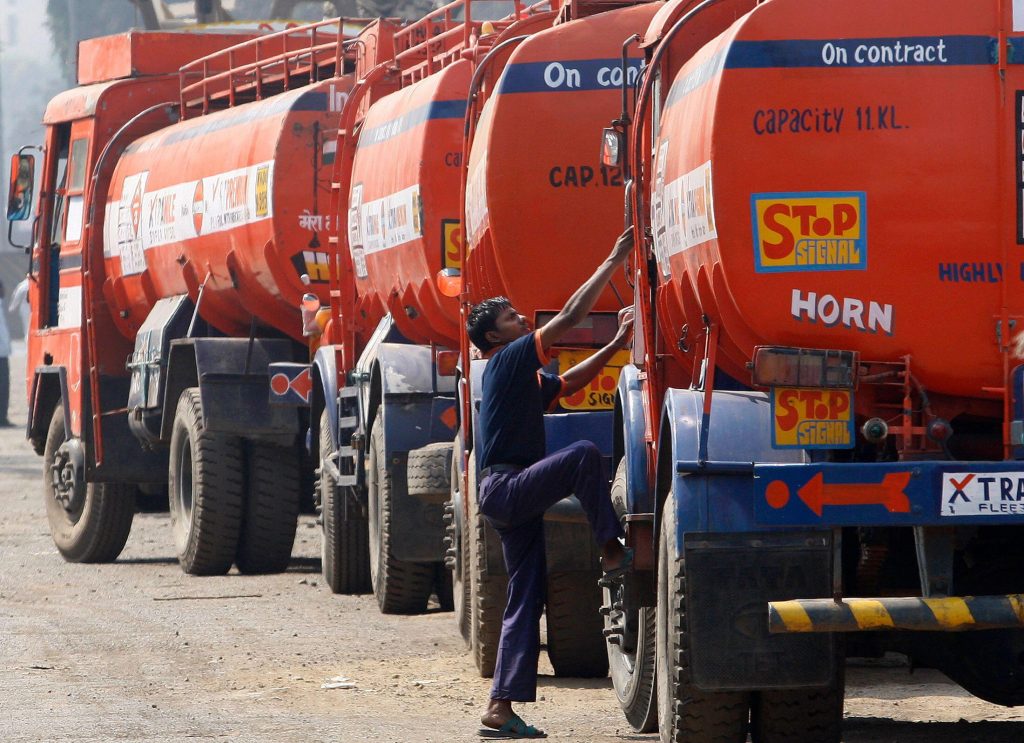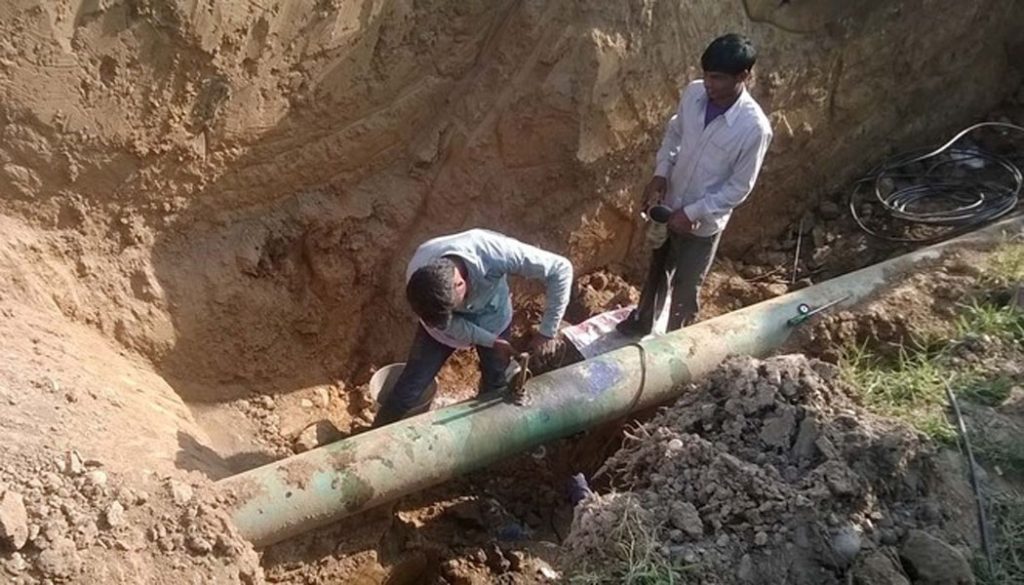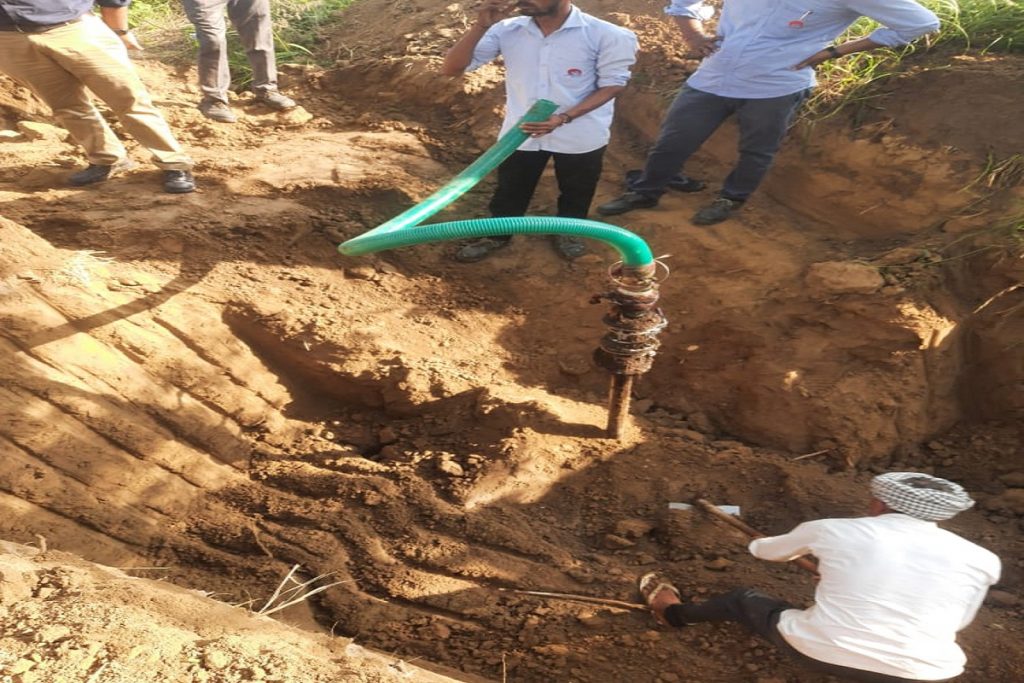Half-hearted government steps are not enough to rein in the thriving oil mafia, which has been plundering oil wealth and bleeding the exchequer for decades. A report by Tehelka SIT
“I was a vigilance head of Indian Oil Corporation [IOC] of North India from 2001-2004. And I saw how petrol-diesel and aviation fuel were stolen by using different means: through oil tankers, oil refineries’ pipelines, and also by using government vehicles. The stolen oil was then sold either to petrol pumps or to small-scale or large-scale industries. This stolen oil is sold at cheaper rates as compared to the one sold in the normal market. Even some petrol pumps sell the stolen oil to the customers. The pump owners buy the oil for cheaper rates and then earn a huge profit. Adulteration of automobile fuel is also a big problem. In short, oil mafia still exists in the country, despite several measures having been undertaken to rein them in. It makes a profit of thousands of crores by providing stolen oil to the buyers even as it causes a huge loss to the National Exchequer, ” said R.K. Chaturvedi, a retired IPS officer and the present member of Uttar Pradesh Police Recruitment and Promotion Board, while speaking to Tehelka.

The oil mafia has grown phenomenally over the years. It first reared its ugly head in the early 1980s. At that time, there was a sudden rise in the sale of vehicle even as the country was grappling with the crisis of fuel shortage. Powerful individuals with the help of some underworld operators formed a cartel and spread their area of operation across the country. Later, some politicians, policemen and powerful industrial houses, too jumped in to have their fingers in the pie. Over the years, the illicit industry has spread to many states like Gujarat, Uttar Pradesh, Maharashtra, Rajasthan, Madhya Pradesh, Punjab, Delhi, West Bengal, Assam etc. The Associated Chambers of Commerce and Industry of India [ASSOCHAM] gave its report about the oil mafia in the country to the then Congress-led central government in 2006. According to the sources, in terms of monetary figures, the illegal industry of oil would be of Rs 10,000 crore annually.
The extent of the power the oil mafia wielded can be gauged from the ghastly murder of IIM-Lucknow graduate Manjunath Shanmugam [2003 batch]. The killing had sparked massive outrage, and had become a national talking point. Manjunath, a sales officer of the Indian Oil Corporation, was murdered in Lakhimpur Kheri, Uttar Pradesh, on November 19, 2005, by a petrol pump owner and his accomplice as a retribution for launching a crusade against adulterated fuel. His body was recovered from a secluded area on the border of Lakhimpur Kheri and Sitapur districts. Manjunath had warned the pump owner that his filling station would be sealed for selling adulterated diesel. On the day of his murder, Manjunath had gone to check the oil quality at the pump. The Lucknow bench of Allahabad High court pronounced life imprisonment to seven people including the petrol pump owner in 2009. On January 8, 2023, one of the convicts serving life imprisonment was released from prison for his good conduct in jail. A few years after Manjunath’s death, an eponymous biopic “Manjunath”, aiming to drive home a strong message against corruption, was released which gained a lot of media attention.

But Manujanth was not the only one to have been killed by the oil mafia. The Additional District Collector of Malegaon [Maharashtra], Yashwant Sonawane, was allegedly burnt alive by an oil adulteration mafia at Manmad near Nashik on 25th January, 2011. However, the CBI investigation later revealed that he was killed due to past enmity and that Sonawane had demanded bribes from the same mafia. Meanwhile, Chhota Rajan and eight others got life imprisonment in 2018 in journalist J Dey murder case. Initially, the police suspected that J Dey had also been killed by the oil mafia because the journalist was working on a report that would have exposed the nexus between oil mafia, police and politicians. J Dey was murdered in June, 2011. These are a few incidents which indicate the reach of the oil mafia in India.
Forget the automobile fuel. Oil mafia has not spared even the aviation fuel. Numerous cases of aviation turbine fuel [ATF] thefts have also surfaced during the past years. The recent one pertains to Hindustan Petroleum Corporation Limited [HPCL]. The company located a hole in the main pipeline that carries aviation turbine fuel all the way to Chhatrapati Shivaji Maharaj International Airport, Mumbai. Indicating that it was an attempt to steal the fuel, an FIR has been registered on the complaint of the HPCL.
Speaking to Tehelka, Mr R.K Chaturvedi also confirmed that the oil mafia is also involved in the theft of aviation turbine fuel for a long time. Not only automobile and aviation fuel, the cooking oil has also become the target of oil mafia gangs. The Ukraine-Russia war has pushed up the price of sunflower oil. The prices of edible oil and food grains have also gone through the roof while hoarders continue to rake in the profit. Gujarat’s food supply department has stepped up raids to nab hoarders and black marketeers.

In the wake of the reports of a thriving oil mafia in India, Tehelka decided to carry out an investigation into this illicit oil trade. Several RTIs were filed to get to the bottom of truth. The truth which everyone wants to know: right from the common man to the families of those who were killed by the oil mafia. According to an officer of Indian Oil Corporation, there are estimated 15,000-km long oil pipelines spread across India. First, the crude oil through these pipelines reaches the respective refineries spread across India. And from there, pipelines are used to supply the refined oil to the depots of various oil companies. Even the aviation fuel, the air turbine fuel (ATF) is supplied through these pipelines. The oil pipeline network is so dense that the ordinary person would not know that the piece of land on which he or she is standing has an oil pipeline underneath it. These pipelines carrying oil should naturally be well protected. But according to R.K Chaturvedi, there is no separate force in place to protect these sensitive oil pipelines. Only local police is deployed to take care of these pipelines. With the result that thugs, by putting holes in these pipelines, have been stealing oil since decades.
Responses to RTIs in possession of Tehelka indicate that oil from these pipelines is stolen on a regular basis, and that too under the nose of the police and the refinery officials. Through RTIs, Tehelka got a long and never-ending list of oil theft cases. Right from Gujarat to Rajasthan,Uttar Pradesh, Punjab, Haryana, Jharkhand, West Bengal, Maharashtra, Bihar etc.
Oil mafia has not spared any oil company pipeline in which they have not put a valve and stolen oil. They have stolen oil from the pipelines of Indian Oil Corporation, Bharat Petroleum, Hindustan Petroleum and Oil and Natural Gas Commission [ONGC]. The impunity with which the oil mafia has struck repeatedly indicates that the security of the oil companies pipelines is not up to the mark. Mathura saw a bizarre incident of oil theft. There, the oil mafia set up its own small refinery near the crude oil pipeline. It stole the crude oil from the pipeline and after getting it refined in the refinery, it sold it to his customers. The accused did this on a regular basis before he was arrested. He was later released on bail. The nexus between oil mafia, politicians, refinery officials and police can be judged from the fact that in 2020-21, when entire country was under lockdown due to Covid-19, the oil mafia continued to steal oil from the pipelines of different refineries in different parts of the country before selling it to their regular customers.

To understand how the oil mafia is able to steal oil from the pipeline, we approached a technical expert. He explained that when any fuel, petrol or diesel, is released in the pipeline, it is released with certain pressure. To increase its speed, some more additional air pressure is released with it. Another expert said that to increase oil pressure in the pipeline an additional 50kg per centimeter air pressure is released in the pipeline. This indicates the speed at which oil travels through pipelines. If police officials and refinery officials are to be believed, most of the fuel theft cases have occurred after the mafia punctured the pipelines by putting valves into it. Now, the question arises as to how oil mafia are puncturing oil pipelines which are 8-24 inch in diameter, with oil flowing through them with high speed? There is a possibility that a blast may occur or a pipe may catch fire if such an attempt is made.
According to R.K Chaturvedi, the oil mafia steals oil from the pipelines by puncturing the pipelines after putting valves into them. Some lower staff of the refineries or the employees working on the contract basis tip off the mafia about the timing of the oil release: at what time, the diesel will flow in the pipelines and at what time petrol or aviation fuel will flow. With the help of this information, the mafia steals oil from the pipelines. According to Chaturvedi, there is always a gap of four to five hours between the release of petrol and diesel in the same pipelines in order to avoid mixing of the two oils. During this period when no oil flows in the pipelines, the pipelines are shut. After the mafia is tipped off about this intervening period by an insider, it swings into action. They punch a hole in the pipeline and wait for the oil to flow through the pipeline again. This is how the oil is stolen from the pipelines. Otherwise, an attempt to puncture the pipeline with oil flowing through it with high speed is like inviting a big tragedy.
According to sources, all oil pipelines carry a meter when oil is released with the pressure in them. The function of the meter is to immediately detect and inform the refinery officials about the leakage, if any, and pinpoint the spot where the leakage is occurring. If this is the case, then how some oil mafias have been recklessly pilfering oil for days and months from the pipeline after putting a valve and puncturing it without being detected by the refinery officials. R.K Chaturvedi told Tehelka that if any oil pipeline gets punctured by the mafia for stealing oil, the air pressure of the oil immediately comes down on the meter attached to it, alerting refinery officials about the possible oil pilferage.
According to RTIs, numerous oil theft cases have been registered in the country. But in most of these cases, the refineries had not mentioned about the quantity of oil that had been stolen. In some cases where they have mentioned the quantity, the figures given are so low that one would feel like laughing at those numbers. According to the refinery officials, to know the exact figure of stolen oil from the pipelines carrying millions of litres of oil is very tough. But Tehelka is in possession of responses to two RTIs of 2018 and 2020, which clearly mentions the quantity of oil that has been stolen from the pipelines. This raises a question mark over why other refinery officials are withholding information and giving different reasons for not disclosing the figures of stolen oil? The RTIs of 2018 of Hindustan Petroleum and of 13th February 2020, clearly indicate the quantity of oil that has been stolen. The response to RTI of 13th February 2020 says that the 1690 litres of Aviation Turbine fuel had been stolen from the pipeline, the FIR of which has been registered in the Chembur police station , Mumbai. In this case, the company has mentioned the exact figure of stolen oil. Such cases however are few. But there are many instances where the companies have not disclosed the oil theft figure in the cases registered with respective police stations, which raises doubt on their intentions. If financial experts are to be believed, the CBI is handed over only those cases of corruption from the government and semi-government sectors, where money involved has crossed a certain threshold amount. Is this the reason why refinery officials are not disclosing the quantity of oil theft? Because by suppressing the figures they may have succeeded in circumventing a CBI inquiry.
On April 12, 2013, villagers in Mathura helped unearth a racket through which crores of litres of crude oil was estimated to have been siphoned off from the main pipeline of Indian Oil Corporation between Salayan in Gujarat and the Mathura refinery near Sonoth village in UP, about 45km from Mathura city. Police unearthed a 400 metre pipeline of two inches in diameter through which the crude oil was being stolen from the underground main line – probably for the past three years. This crude oil was refined in the makeshift refinery developed by the mafia and the refined oil was supplied to their customers. The villagers told the police that many oil tankers visited a makeshift structure situated in the middle of a farm on the village outskirts every night, but by dawn the entire area would wear a deserted look. On the basis of this complaint, the police unearthed the oil theft racket, probably the biggest in the Mathura region, and registered a case against Mukesh Thakur and his nephew Subhash. According to the RTI reply, this case is still on. But despite several RTIs, the Mathura Police and refinery have yet not disclosed the quantity of oil that had been stolen by the mafia. They argued that they cannot part with this information because the matter is pending in the court.
Magorra police station of Mathura, under which the above case was registered, revealed in an RTI that after the April 12, 2013 case, there was no case of oil theft registered in their police station between January 1990 to December 2020. But contrary to this, an RTI reply of 6th July, 2021, of Indian Oil Corporation’s Panipat refinery said that before April 12, 2013 there was another case of oil theft registered in the Magorra police station on December 12, 2011. Why Magorra police station is hiding this 2011 oil theft case, can be best answered by the Mathura police themselves? Before April 12, 2013 oil theft, there was another oil theft reported in Mathura on March 16, 2013 under Refinery police station. Three more cases of oil theft were registered in Vrindavan police station in April, May and June in the year 2015. All these oil theft cases indicate how active the oil mafia is in the region.
According to the sources, the two biggest oil theft cases of India were reported from the Mathura region of Uttar Pradesh. In the first case which came to light in 2013, the accused was Mukesh Thakur. In the second case in 2017, Manoj Goyal of Agra was alleged to be behind the pilferage. It is said that this oil plunder was to the tune of more than Rs 100 crore. Goyal allegedly enjoyed close ties with several administrative officials and had a network spread across dozens of Indian cities, where he allegedly supplied the stolen oil. His nexus with officials enabled him to steal oil from pipelines laid around Mathura refinery for almost two years before the fraud was detected in a dramatic style. Mathura refinery officials got news that some petrol pumps of Agra and Delhi-NCR were selling oil for a price lower by one or two rupees than the normal rates. The investigation carried out by the refinery officials confirmed this report and after a complaint with the Uttar Pradesh police, the matter was handed over to the Uttar Pradesh Special Task Force [UPSTF]. The STF during its investigation in Agra and Delhi-NCR found that Manoj Goyal was supplying oil at cheaper rates to petrol pumps in Agra and Delhi-NCR. The STF then homed in on operators of oil tankers supplying oil to the petrol pumps. The owners of oil tankers told STF that they were supplying oil to the pumps after fetching it from a colony in Mathura and not from a refinery. The disclosure led STF to R.K Puram colony of Mathura.
After raiding a bungalow in R.K Puram colony in Mathura, STF found a 100 meter long and 10 feet deep tunnel under that bungalow. The area was close to the Mathura refinery. According to STF, the tunnel was dug in three months. An oxygen pipe was found in the tunnel to supply oxygen for the workers working there. A bulb was also found in the tunnel for providing light. In the tunnel, the STF discovered a Mathura oil refinery pipeline going to Jalandhar in Punjab. Through this pipeline, Manoj Goyal and his accomplice had been stealing for years. Manoj Goyal was booked under Gangsters Act and is presently lodged in a jail. Mathura refinery filed a 3.79 lakh litres oil theft case against Manoj Goyal. In 2021, Manoj Goyal and aide were convicted in another case by CBI special court for cheating and criminal conspiracy.
The petrol and diesel were sold in the market, but where did the pilferers sell Aviation Turbine Fuel [ATF]? According to the sources, the pipeline from which Manoj Goyal stole oil was supplying oil from Mathura to Jalandhar. This pipeline was also supplying ATF. The ATF was either used by Airlines, Air Force or flying clubs. Now the big question is to whom did Manoj Goyal sell ATF? In 2020, Delhi police arrested several people with 100 litres of ATF and with some cash. In Punjab also, similar arrests were made. But the question remains as to whom these people sold ATF?
Sources say that a suspended official of an oil company is helping the oil mafia to steal oil from the pipelines. It is said that putting a valve in the oil pipeline to puncture it is an expert’s job, which only a trained person can do. Sources say that this suspended official is being helped by 4-5 people. It is learnt that the same suspended official helped Manoj Goyal in putting a valve in the Mathura refinery pipeline passing through the tunnel to steal oil.
Replies to several RTIs tell that a large number of oil theft cases have come to the fore in the country so far. According to the IOC reply, from 2009 to 2021 there were 22 oil theft cases going on in various courts. In response to another RTI, the IOC replied that between 2015-16, there were 58 cases in which their oil pipelines had been attacked for oil theft. In 2016-17- ten, in 2017-18 – four, in 2018-19- thirty eight, in 2019-20 – thirty eight, in 2020-21- twenty-seven and in 2021-22 – twenty-three incidents of oil theft cases were recorded.
Several RTIs were filed to ONGC as well: on 21st September 2021, on 11th February 2022, on 1st April 2022, and on 23rd November 2022. In all these RTIs, the ONGC has not parted with any information on oil theft. In response to September 21, 2021 RTI query, the ONGC refused to give information on the ground that the applicant’s style of seeking information is ‘investigative one’. On 11th February, 2022, the ONGC rejected the application on the same grounds. While responding to the RTI application filed on 1st April 2022, the ONGC said that they were not bound by the RTI Act to give reply to such a query. They repeated the same answer in the case of 23rd November 2022 RTI application.
When the first appeal was filed in response to ONGC reply, the then appellate officer on 23rd December, 2022, directed the ONGC to give reply within 20 days. Despite this, ONGC has not given any information to the applicant till the time of filing this report. On 6th September 2021 also, in response to an appeal, the appellate officer directed the ONGC to reply within seven days. But the corporation refused to budge and did not part with any information. The action of the appellate officer in this case has also not been consistent. Sometimes, he directed ONGC to give information. Sometimes, he directed the applicant to go in for a second appeal if he is not OK with the reply.
In an RTI reply, the IOC has given information about incidents of oil theft from 2015 to 2018. But they have not shed light on the amount of oil that has been stolen. Like in 2015, there were 25 cases of oil theft. But the IOC revealed about the quantity of oil that has been stolen only in nine cases. Similarly, in 2016, out of four oil theft cases, the info about how much oil had been stolen was provided only in two of the cases. In 2017, out of nine oil theft cases, the information about the quantity of oil stolen was provided in only three of them. Similarly, in 2018, out of seven oil theft cases, we got to know the quantity of oil stolen in only two of them.
When asked as to how these oil mafias come to know about these oil pipelines, R.K Chaturvedi said that these mafia gangs do recce of the area. They get information from the people of the area and the low level officials of the oil companies and refineries and police. If they get information that the oil pipeline is passing beneath some farm land. They approach the owner of that farm land, and take that land on rent for cultivation. And after that they develop a temporary structure on a small part of the land, so as to avoid detection. And from that structure they dig land to reach the oil pipeline. After that they put a valve in the pipeline, puncture it and steal the oil, adds Chaturvedi.
The biggest oil pipeline network in India is of Indian Oil Corporation (IOC). So, Tehelka decided to get their side of the story on oil theft. We contacted Shreyas Verma, the senior maintenance manager of the pipeline division of Indian Oil Corporation. In the first instance, he refused to answer our queries on oil theft. But later on, he agreed to answer our queries if they were emailed. But when we did not receive a reply even two days after we had mailed the queries, we again contacted him on the phone. He said that our email had been forwarded to the senior officials for the answers. But till the time of the filing of this story, Tehelka did not get any response to our mail from the Indian Oil Corporation authorities.
Why can’t the oil mafia be eradicated? How long will the common citizens have to wait for the system to cleanse itself? Good clean unadulterated fuel is your right. We need to get a message across that so many honest officers did not die in vain. Get out of your cars and bikes, and demand that you be given the complaint books, and write what you think and feel in them – today. In today’s age when even pizza delivery companies can and do track their delivery staff by a variety of methods. Why can’t the oil companies and the Ministry in charge assure us that there won’t be any oil theft or oil adulteration? Time to stand up and demand it.












